Search Thermo Fisher Scientific
Invitrogen
CD86 Monoclonal Antibody (BU63), FITC
This Antibody was verified by Cell treatment to ensure that the antibody binds to the antigen stated.
FIGURE: 1 / 5
CD86 Antibody (MHCD8601) in Flow
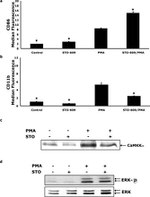
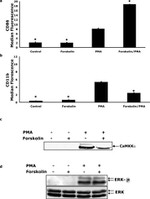
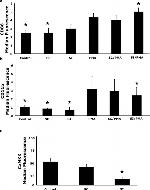
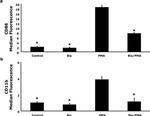
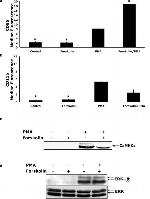
Product Details
MHCD8601
Species Reactivity
Published species
Host/Isotype
Class
Type
Clone
Immunogen
Conjugate
Excitation/Emission Max
Form
Purification
Storage buffer
Contains
Storage conditions
Shipping conditions
RRID
Product Specific Information
Commonly used, FITC conjugates provide relatively high absorptivity, excellent fluorescence quantum yield, and good water solubility.
Target Information
CD86 is one of two ligands (the other CD80) for CTLA4 and CD28. CD86 acts as costimulatory molecule in eliciting T-cell help during antigen presentation. Antigen presentation in the absence of sufficient co-stimulation involving CD86/CD80 can induce tolerance. CD80 appears to play a role distinct from CD80 in T helper cell differentiation. CD86 is a type I membrane protein that is a member of the immunoglobulin superfamily. The CD86 protein is expressed by antigen-presenting cells, and it is the ligand for two proteins at the cell surface of T cells, CD28 antigen and cytotoxic T-lymphocyte-associated protein 4. Binding of CD86 with CD28 antigen is a costimulatory signal for activation of the T-cell. Binding of CD86 with cytotoxic T-lymphocyte-associated protein 4 negatively regulates T-cell activation and diminishes the immune response. Alternative splicing results in two transcript variants encoding different isoforms of CD86. Additional transcript variants have been described for CD86, but their full-length sequences have not been determined. Diseases associated with CD86 dysfunction include gallbladder squamous cell carcinoma and myocarditis.
Analyte Specific Reagent
How to use the Panel Builder
Watch the video to learn how to use the Invitrogen Flow Cytometry Panel Builder to build your next flow cytometry panel in 5 easy steps.
Bioinformatics
Protein Aliases: Activation B7-2 antigen; B lymphocyte activation antigen B72; B-lymphocyte activation antigen B7-2; B70; BU63; CD28 antigen ligand 2; CD86; CD86 antigen (CD28 antigen ligand 2, B7-2 antigen); CTLA-4 counter-receptor B7.2; Early T-cell co-stimulatory molecule 1; FUN-1; MGC34413; T-lymphocyte activation antigen CD86
Gene Aliases: B7-2; B7.2; B70; CD28LG2; CD86; LAB72
UniProt ID: (Human) P42081
Entrez Gene ID: (Human) 942

Performance Guarantee
If an Invitrogen™ antibody doesn't perform as described on our website or datasheet,we'll replace the product at no cost to you, or provide you with a credit for a future purchase.*
Learn more
We're here to help
Get expert recommendations for common problems or connect directly with an on staff expert for technical assistance related to applications, equipment and general product use.
Contact tech support

